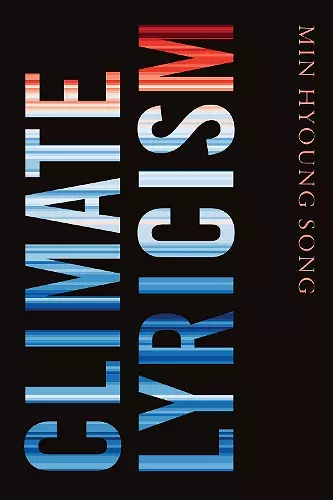Climate Lyricism
Format:Paperback
Publisher:Duke University Press
Published:9th Feb '22
Should be back in stock very soon

In Climate Lyricism Min Hyoung Song articulates a climate change-centered reading practice that foregrounds how climate is present in most literature. Song shows how literature, poetry, and essays by Tommy Pico, Solmaz Sharif, Frank O’Hara, Ilya Kaminsky, Claudia Rankine, Kazuo Ishiguro, Teju Cole, Richard Powers, and others help us to better grapple with our everyday encounters with climate change and its disastrous effects, which are inextricably linked to the legacies of racism, colonialism, and extraction. These works employ what Song calls climate lyricism-a mode of address in which a first-person “I” speaks to a “you” about how climate change thoroughly shapes daily life. The relationship between “I” and “you” in this lyricism, Song contends, affects the ways readers comprehend the world, fostering a model of shared agency from which it can become possible to collectively and urgently respond to the catastrophe of our rapidly changing climate. In this way, climate lyricism helps to ameliorate the sense of being overwhelmed and feeling unable to do anything to combat climate change.
“Coining climate lyricism, Min Hyoung Song recuperates collective agency as a mingling of attention, perception, and responsiveness. He doesn’t skirt the despair of climate catastrophe but, rather, reckons with it to find reasons to continue. The book follows its own lyrical flow as it integrates personal reflections from pandemic lockdown with readings of literary texts informed by ecocriticism and critical race theory. Song shows that questions of racist exclusion and harm are never far from questions of environmental thriving, just as the struggles of climate crisis are never far away even when they are not explicit on the page.” - Heather Houser, author of (Infowhelm: Environmental Art and Literature in an Age of Data) “Min Hyoung Song presents a thrilling and powerfully argued case for literature and poetry as a means of cultivating sustained attention to climate change in this tumultuous time. Using an innovative framework to draw forth the complex and multifaceted ways climate change becomes apprehensible, Climate Lyricism will undoubtedly make a significant impact on conversations in ecocriticism, contemporary literary studies, and studies of climate change.” - Margaret Ronda, author of (Remainders: American Poetry at Nature's End) "Song poses a fascinating question: how do poems and works of fiction that do not appear to be about climate change-particularly those more explicitly engaged with race-show traces of the ongoing ecological crisis? Song’s sources are contemporary and well chosen. . . . Highly recommended. Lower-division undergraduates through faculty." (Choice) "Song’s engagement with writers of color throughout Climate Lyricism offers an important, compelling, and original intervention into both lyric studies and ecocriticism because historically, both of these fields have tended to center white voices and texts." - Heather Milne (ISLE: Interdisciplinary Studies in Literature and Environment) "Climate Lyricism provides valuable insights into how climate change affects different communities and cultures, including Asian Americans. It encourages readers to appreciate nature’s beauty and take action against climate change while emphasizing the need for solidarity among different ethnic groups when tackling environmental issues. This book is particularly relevant to Asian Americans as it urges them to play an active role in addressing this global challenge." - Ang Li (Society for US Intellectual History) "Song's work is effective: the personal tone of his writing is disarming, fostering a deep sense of connection both with the critique of the literature analyzed and with precisely that shared sense of blended agency/urgency that the ecological challenge demands." - Melanie Ebdon (Modern Language Review)
ISBN: 9781478017738
Dimensions: unknown
Weight: 363g
256 pages